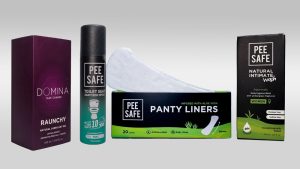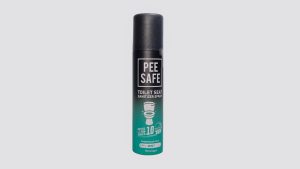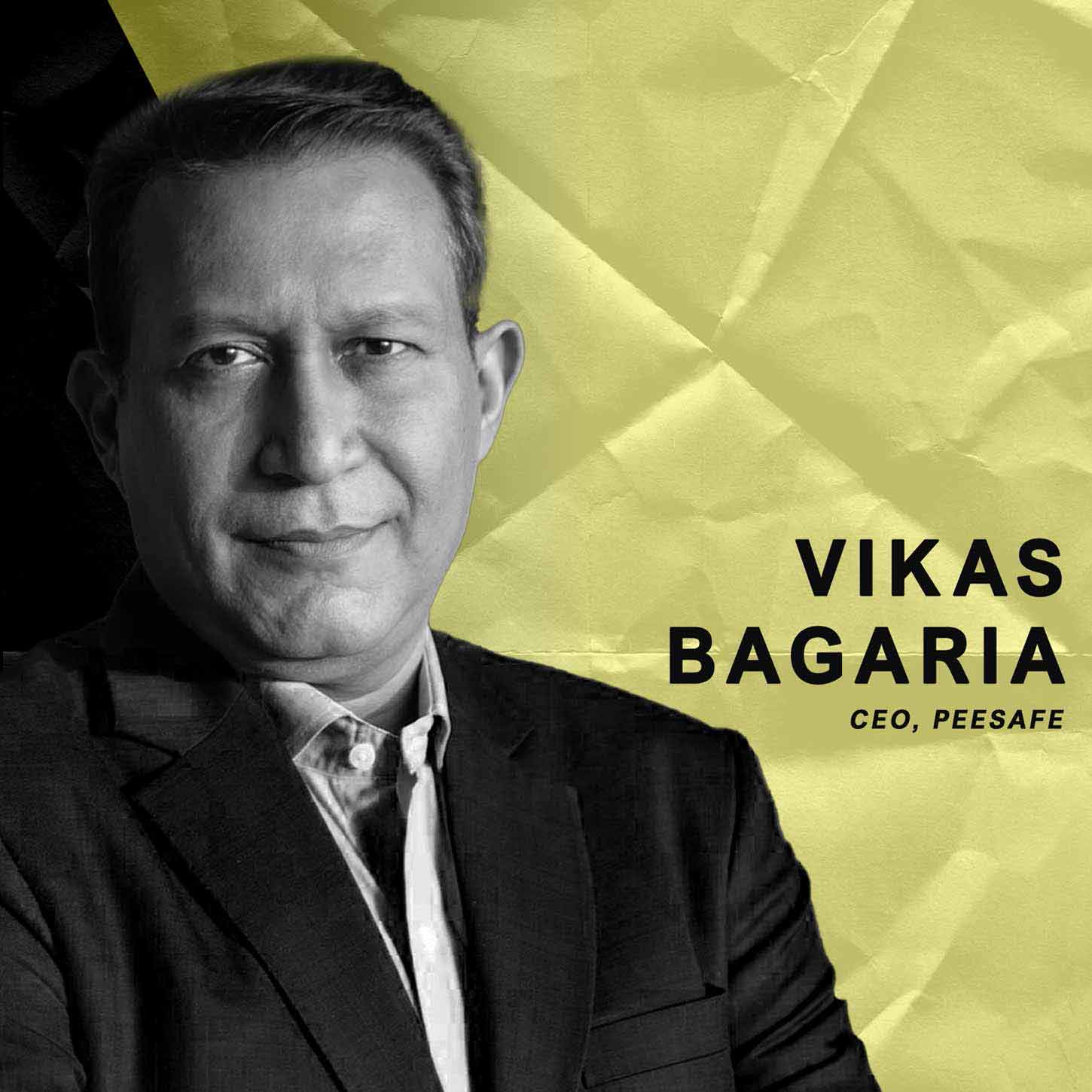CATEGORIES
Health and Wellness | People We Admire | Women EmpowermentOverview:
- Feminism and female hygiene go hand in hand; we cannot possibly talk about feminism without including the basic needs of women.
- Sustainable menstrual hygiene is where we can measure impact.
- We wanted to both make a generic term for toilet seat sanitizers and be bold in the name to raise awareness about UTIs (urinary tract infection).
- The biggest achievement is to be able to impact these millions of women in their lives.
1. What was your childhood like, and how did your experiences shape you into the person you are today?
Vikas:
I come from a middle class business entrepreneur family. My father’s independent nature inspired both me and my sister to start our own respective ventures. I grew up in a safe environment with parents who wished to give us the best of everything, in terms of education and support.
Being a 70s kid, we had to unlearn and relearn many things along the way. One of my core memories as a child were the dinner table conversations. Every day, I used to look forward to listening to my father discuss the debits, credits, profits, and challenges of being an entrepreneur with my mother.
Naturally, the struggles of being an entrepreneur were introduced to us very early on in our lives. In retrospect, my inclination and interest in sports has proved to be instrumental in running a business.
Rithish:
I grew up in a military family in Shillong, India. Living there gave me unique perspectives as I belonged to a middle-class business family, unlike many peers from big cities. Growing up in the safe confines of the Cantonment area was a blessing, allowing me to explore freely since a young age. As a teenager, I developed a passion for long-distance running and enjoyed engaging in debates and representing at forums.
My parents always emphasized providing us with the best education and manners, and we learned the value of hard work as seventies kids. With my father being an entrepreneur, our breakfast discussions often revolved around business matters. Although not academically driven, I managed to navigate through everything, learning from both my peers and experiences.
2. Looking at what you have accomplished now, what would you tell a younger version of yourself?
Rithish: Starting earlier is crucial for success, as it takes time to reach your desired goals. Initially, as Pee Safe, we were cautious and less experimental. However, we learned from our mistakes and have seen great success in international markets now.
Vikas: Our journey was more of a learning experience than a series of mistakes. If I could redo it, I would have focused less on digital platforms and invested more in building a strong offline presence. We are now present in over a hundred cities and 20 countries, with a strong brand value based on trust.
Rithish: Being pioneers in our category globally, we had to experiment heavily, which led to significant digital spending to create awareness.

3. What have been some of the structural and societal challenges you have faced as an entrepreneur?
Vikas: In India and even in the Philippines, there are hardly any male entrepreneurs in Femtech. When we started, this culture of Instagram influencers wasn’t prominent but launching Pee Safe grabbed eyeballs for the wrong reason. I wanted to make it a generic name just like Dettol or Xerox.
Most of our conferences and seminars were typically conducted by women, excluding men. With the expansion of social media, people’s perspectives have shifted. Gradually, inclusiveness became prevalent, and men, like you, came forward to discuss intimate wellness, showing that men can be part of these conversations too.
Rithish: There was this little reverse discrimination initially, which, I think, now isn’t as much. I think feminism was largely women back then, but that has changed now. We had concerns and challenges, but we’ve built up on top of that and came through, showing that this brand is for overall feminine hygiene.
4. Given the ordeals that women have to face every day with respect to public washrooms in India, what was the level of research that went into building Pee Safe products?
Vikas: It all started as a passion to find a solution for my wife’s urinary tract infection during travel. From our extensive research, we found that every year about 200 million women suffer from Urinary Tract Infection (UTIs) globally, and around 10 million of them are from India.
UTIs are not only spread from the toilet seat, but largely due to holding of the pee for longer durations. To curb this dilemma, we started searching for products to help with it—but there weren’t any. This signaled an increasing demand for a public hygiene brand and that’s when we launched a toilet seat sanitizer that has a foam factor which cleans, evaporates, and leaves no residue.
The endeavor to normalize toilet hygiene was to establish a notion of protecting oneself against avoidable diseases. Gradually, we gained confidence and trust in people, which significantly reduced the number of people suffering from UTIs.
5. Having a social responsibility attached to your products, how do you measure success beyond monetary gains, and what are some goals you have for your company?
Rithish: We can’t quantify UTI reduction, but the impact of sustainable menstrual hygiene is measurable. So far, we’ve sold over a million menstrual cups and about 300,000 reusable pads, reducing pad waste significantly.
We offer biodegradable pads and tampons, amounting to around 100 million pads that would take 2,000–3,000 years to fully degrade in landfills. This has a significant impact on reducing environmental waste.
In addition, we have a group called #HaqSePERIOD, involving young volunteers, especially college girls. Our program managers train them to raise awareness and provide education about menstruation and proper hygiene practices in suburban, semiurban, and rural areas.
We aim to develop habits of using menstrual products, considering that government data shows only a 35 percent penetration in India, potentially much lower in reality.
To reach the 200 million menstruating women in the country, we donate pads and menstrual cups. Our primary focus is on distributing reusable pads. While initially, they may use the pads once, managing monthly logistics becomes challenging.
We provide cloth pads to those accustomed to using cloth, which can be reused for 60 cycles (approximately 14 cycles per wash). Our goal is to encourage the habit of using a more hygienic menstrual product, impacting the lives of around 200,000 women, particularly in underprivileged areas.

6. Do you have any mentors, advisors, or role models that keep you motivated and inspired to be who you are today?
Vikas: In those days, there was a lot of bias, and people got in through their connections. When she couldn’t get admitted into the college she wanted, she said, “I have to make my own brand.” She was 16 when she started her career as a lingerie designer. Imagine a lingerie designer from India in the 80s, when people used to pronounce it linger-ee.
In the eighties, talking about creating a brand was unimaginable. She started from scratch, and I’m so proud of her that she has built her own brand and serves as a visiting faculty in every fashion institute in the world—be it Milan, New York, or London. She is my role model for creating that academy for herself.
She ended up working with big designers for movies and made a name for herself from being a lone designer to creating a fashion house. A girl from a traditional Marwari family is getting into lingerie; maybe we have it in our genes—she works in the intimate wear industry, and I work in intimate hygiene.
7. You must have a very tight schedule. How do you balance investing in your career and investing in yourself?
Rithish: I have found my balance between work and life. I don’t really see a very different life outside of work. We work and learn like a family here at Pee Safe, ensuring that everyone is looked after. We’re there for each other, and this kind of culture that we’ve built really helps. Of course, there are work commitments, but it works out.
Vikas: I’m from Calcutta, East India, where the sun rises one hour earlier than Delhi, even though we are in the same time zone. My college years made me an early riser as I had to wake up at 5 a.m., which I still continue doing. By seven o’clock in the morning, I’m done with all my emails and important readings. I think morning is the me-time when you can work without somebody disturbing you and the work is done and dusted by 7 o’clock.
Rithish: I wake up at around 7 a.m., and start my workout for an hour and a half at the gym. Then I come back and see loads of things piled on! Jokes aside, it’s genuinely fun. Like Vikas said, waking up early really does make a lot of difference because those couple of hours in the morning are to yourself, and you can really utilize them for yourself.
8. What do you consider as your biggest achievement and what do you hope to achieve in the future?
Vikas: The Prime Minister of India mentioning sanitary napkins is a significant achievement. We’ve impacted millions and inspired young entrepreneurs to talk about this category. Initially at 18 percent, menstrual product penetration in India has grown to 33 percent due to increased awareness and discussions.
Rithish: Our biggest achievements lie in impacting the lives of millions of women through education, training, and support. We aim to further this movement and strive to reach 100 percent participation, supporting it in every way we can.
Conclusion:
The inspiring journey of Pee Safe’s visionary entrepreneurs Vikas and Rithish showcases their unwavering dedication to women’s health that has created the much needed impact in the lives of millions of women worldwide. By introducing innovative products and empowering initiatives, Pee Safe’s journey of breaking barriers and safeguarding women’s intimate health is a testament to the power of social responsibility and drive to make a difference. With their bold vision, Pee Safe continues on its mission of enhancing women’s health around the world.


